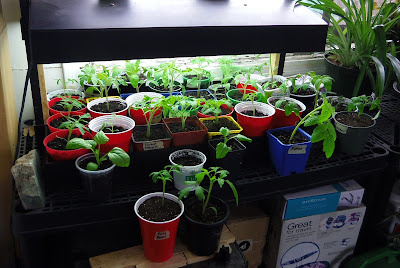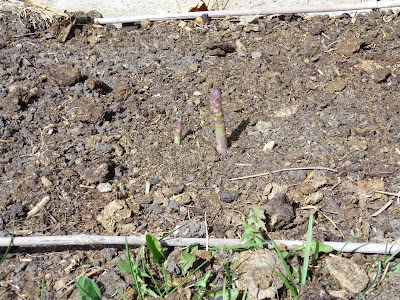The 2024 gardening season begins!
It has been a mild week or two, unusual for the end of March and start of April. As I sit and type this, it is 8 degrees outside, breezy, and there is not a speck of snow on the ground. The little patch of chives on the south side of the house has started to grow.
I haven't grown peppers for a few years, but started Anaheim (hot) seeds on February 22nd, Ajvarski (a sweet red pepper) on March 16th, and jalapeno (hot) on March 18th. I started several Yellow Banana (a sweet yellow variety) on the 16th as well, but only one germinated. If the jalapenos grow well, I hope to try my hand at canning "Cowboy Candy", a spicy, sweet condiment that apparently adds a delicious jolt of heat to things burgers, pasta dishes, baked brie, etc.
 |
Assorted peppers
|
Kale (Siberian Dwarf, Lacinato, Rainbow Lacinato, and Curly Blue) and cabbage (Copenhagen Market, Early Jersey Wakefield, and Brunswick) were started in milk-jug greenhouses and placed outside on March 25th. I also planted a milk jug greenhouse with parsley and one with Early Charm asters around the same time.
Indeterminate tomato varieties were started on March 30th, and the dwarf and determinate varieties were started on April 1st. As usual, I did not narrow down the number of tomato varieties to twelve or fewer, despite swearing last year at harvest time that I would when it came time to start seeds this Spring! There are so many interesting varieties to try. It is always a battle between choosing varieties that are familiar and dependable to me and varieties that are unusual and rare.
Though it is a toss-up as to whether they will germinate (the seeds are from 2009), I planted Zolotoe Serdtse on April 1st. Zolotoe Serdtse is an early determinate orange heart tomato. If they don't germinate, Native Sun (an early determinate yellow variety) or Gold Dust (an early determinate orange variety) will be started in it's place. Though I have no idea where I would find room for it, I might also start Elf Tears as well. It is quite an uncommon variety with fruit as whimsical in appearance as it's name might suggest: small, elongated bottle-shapes with variegated colouring that starts as dark red at the tops, transitions through pink/gold, and is dull orange at the bottom (the "bottle's" base).
Tomato Selections 2024
(* indicates my first time growing this variety)
Determinate or Dwarf
*Manitoba (DET, red, heirloom, 3-inch, 6oz, round fruit. Meaty and juicy, great flavour. Bush-type plant, vigorous growth. Grows well in all conditions, though they
thrive in cooler climates. Early 65-70
DTM , good canner/slicer. Developed at the Morden Research station
in 1956, Manitoba has been a prairie favorite for years.)
Ropreco
(DET, small red paste that has a small point on the
blossom end, 2-3” long, 2-3 oz, productive, sets well in cooler weather. A small plant but still best to support because
it is heavy with fruit. Good for sauces,
drying, and canning. Also tastes good
fresh. Early, ~65-70 DTM, Italian origin)
Black Sea Man (DET, brown/black, heirloom, beefsteak, 8-12 oz, rich flavour, slicer,
determinate, can be grown in large containers, Russian origin, early, ~ 75 DTM)
Dwarf Roza Vetrov (DWARF,
pink, open-pollinated, small/salad fruit, round pointed fruit, early, good in
cooler climates/short seasons. origin: Russian, names translates as “Wind
Rose”)
*Dwarf Audrey’s Love - only 3 seeds - (DWARF, 2-4 oz striped bicolour
elongated plum, chocolate with green stripes, great flavour, 3' tall, heavy
producer, mid-season: 78DTM.)
*Dwarf Firebird Sweet (DWARF, pink & orange striped
oblate, pretty, 4-8oz slicer, sweet rich flavour, vigorous, high-yielding,
~75DTM.)
*Dwarf Speckled Heart - only 2 seeds - (DWARF, red a& gold striped
hearts, 5-12 oz fruit,~ 75DTM).
*Velmozha (DET, pink, large, blunt heart, averaging
200-300g. Early:
70-75 DTM. Bushy plant, 80 cm to 1.40 m tall. Good resistance to
diseases. Russian origin, grown commercially since the 1950s. Velmozha means
‘noble’ in Ukrainian.)
*Zolotoe Serdtse - old seed from 2009 - (DET, orange, “Heart of Gold”, medium sized,
heart-shaped fruit, fruit grows in clusters of 4-5 fruit, fruit averages 3-8oz
each. Productive. Determinate, compact plant. Does well in cooler/northern climates. Early
mid-season: ~75 DTM, old Russian commercial variety.
Indeterminate
*Rozovyi Myod - “Pink Honey” or “Siberian Pink
Honey”, in English (INDET, large pink heart, 6-12oz, sweet flavour. For best flavour, don’t over-water. Early-mid season. 75-80 DTM. Russian origin.)
*Guido (INDET, large deep-red beefsteak,
500-600g, delicious old-time tomato flavour.
80-85DTM. Italian heirloom.)
*Mrs. Bot’s Italian Giant (INDET, large red beefsteak, ruffled at top,
meaty, few seeds, sweeter flavour than a typical red, excellent for sauce or
fresh eating, 10-20oz. ~80 DTM. Originated in Castel Franco in the province
of Treviso in the Veneto region in Italy.)
*Cosmonaut Volkov (INDET, deep red globes, 2-3” fruit,
productive, complex tangy flavor, productive, meaty. ~75 dtm, plants ~ 4 feet tall. Ukrainian – some say Russian - origin. Named for the pioneering
Soviet cosmonaut Vladislav Volkov. In 1971, Volkov spent 23 days aboard the
very first space station, Salyut 1.)
Reinhard’s Chocolate Heart
(INDET, brown oxheart, rare,
rich flavour, 300-400g, cross between Cherokee Green x a pink oxheart.
80-85DTM. German origin.)
Japanese Black Trifele (INDET, black/mahogany, pear-shaped,
medium-sized fruit, rich flavour, ~80dtm.
Despite the name, it’s origin is either Estonian or Russian, depending
on the source you read.)
Striped German
(INDET, bicolour, yellow marbled with blush-red, very pretty, large beefsteak, fruity flavour, ~ 80-85
DTM. Can grow up to 7’ tall. Heirloom from West Virginia, USA.)
Update (April 6th)
Manitoba is showing no signs of germinating and is very old seed, so today I planted Scotia and Early Annie to replace it, along with Gold Dust and Linda.
Dwarf Gold Dust (DWARF, medium-sized orange globes, compact
bush-type plant, firm fruit, good flavour, very early, can be grown in large
pots. Does well in cooler weather. 65
DTM)
Linda (DWARF, red cherry, ~1
inch, excellent flavour, ornamental look, very early, compact, up to 3’ tall, good
in large pots. Ukrainian origin. **Sometimes called a microdwarf, as plants
often stay ~12” tall.)
Scotia (DET, red globes, medium fruit ~ 4oz, early
60-70 DTM, prolific, slicer/canner. Nova
Scotia heirloom.)
Early Annie (DET, red globes, 3-inch
round, canning/slicing, 60-70DTM)








